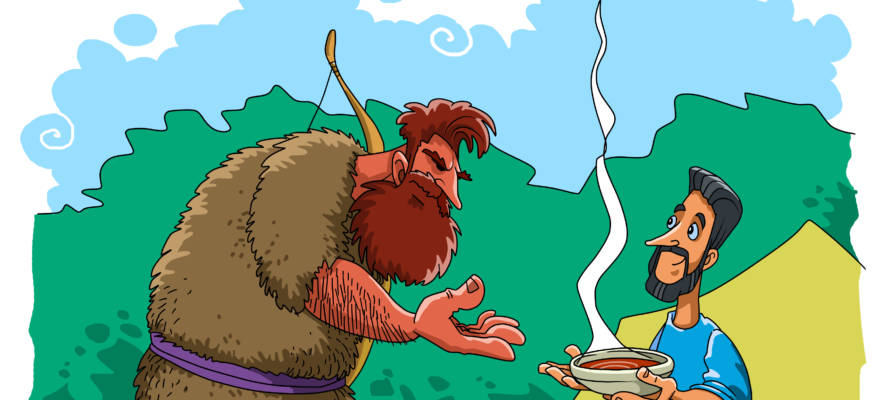When confronted with mortality, do you think about maximizing your impact on the world, or say to yourself, “Eat, drink, and be merry for tomorrow we may die”?
By Rabbi Ari Enkin, Rabbinic Director, United with Israel
In this week’s Torah portion, “Toldot” (Genesis 25:19–28:9), we read about Esav’s sale of the “birthright” to Yakov. The birthright encompassed all the privileges that a firstborn receives, in addition to several extra mitzva responsibilities. As the Torah tells us, Esav came home after an exhausting day of hunting just as Yakov was cooking up a delicious pot of stew. The famished Esav asked for some of the stew. Yakov decided to take the opportunity to make a deal for himself, offering to give Esav some stew in exchange for the birthright, notwithstanding that Esav was technically the firstborn. Esav agreed, promised Yakov the birthright, and enjoyed a bowl of stew.
The commentators tell us that Yakov was cooking stew because Avraham, his grandfather, died that day. Hence, Yakov’s father, Yitzchak, was mourning, and it is customary to serve mourners round foods such as beans, which stew contains.
One might suggest that Yakov’s timing was not appropriate. Here they were, in a house of mourning, grieving the death of the greatest person in the generation, yet Yakov was thinking about cutting deals? Couldn’t Yakov have waited for a different opportunity to bribe Esav for the birthright? What’s going on over here?
It’s explained that the answer to Yakov’s timing can be found in the symbolism of the lentils and the meaning of mourning. The reason that we serve a mourner round food is to remind ourselves that life is like a wheel that is always turning, from birth to death and over again, with everything that occurs in between–in other words, the cycle of life.
It is often precisely when mourning that people begin to contemplate life and their mortality. And the way righteous people contemplate life is very different than the way wicked people contemplate life. The righteous, like Yakov, ponder what they are capable of accomplishing. As such, the period of mourning for Avraham was the moment during which Yakov thought of the birthright and his spiritual direction in life.
In contrast, the wicked, like Esav, contemplate how to best enjoy the pleasures of this world, during such crucial times. What crosses their minds? “Eat, drink, and be merry for tomorrow we may die.” As such, while mourning Avraham, Esav was far more interested in a good meal than in a spiritual future.
Therefore, when looking at the Yakov-Esav exchange from this perspective, the former’s desire for the birthright, and the latter’s desire for a good meal, makes perfect sense. While they both contemplated life in the midst of intense mourning all around them, each one pursued what was most important to them, to very different effect.
There is of course a message for us. We must be sure to focus on the important things in life, and not merely passing pleasures. And even more importantly, let’s not wait until we are in mourning to do so!
For more insights by Rabbi Enkin on this week’s Torah portion, click on the links below.
https://unitedwithisrael.org/living-torah-when-the-going-gets-rough-the-righteous-get-tough/
https://unitedwithisrael.org/living-torah-how-do-you-measure-a-persons-value/
https://unitedwithisrael.org/living-torah-when-educating-children-respect-their-individuality/
https://unitedwithisrael.org/living-torah-attitude-is-everything-2/
https://unitedwithisrael.org/fatigue-is-not-a-jewish-concept/
https://unitedwithisrael.org/living-torah-the-birthright-battle/
https://unitedwithisrael.org/a-bowl-of-stew-or-eternity/
https://unitedwithisrael.org/the-twins/




